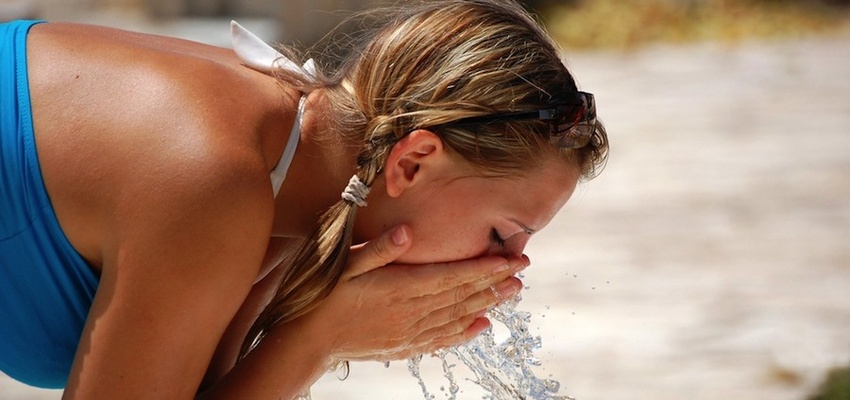Why You Probably Don't Need To Wash Your Face (And What To Do Instead)
If you spend much time on this website, you probably already know that conventional personal care products are filled with nasty chemicals. That’s because the cosmetics industry—the one that makes everything from your shampoo to your bar of soap—is a largely unregulated body that can use whatever ingredients it sees fit, as long as they’re listed on the bottle. (Well, sort of. Some ingredients, like the ones found in fragrance concoctions are not even required to be listed thanks to a sneaky trade-secret loophole that serves mostly to keep consumers in the dark.)
The last time I checked, only 11 ingredients were banned or restricted by the FDA, versus the 1,328 that are verboten in Europe. If you haven’t heard that stat before, take a second to let it sink it. What do profit-driven businesses do when nobody is really keeping tabs on them? Have you seen Wolf Of Wall Street?
Generally, big conventional brands use the cheapest ingredients they can get away with—like those aforementioned synthetic fragrances and cheap chemical fillers—and then market their products like they’re God’s gift to skincare. They're usually anything but. In fact, most of the ingredients used in conventional products do nothing for skin, and some could actually be harming your health.
That’s because a whopping 60% of what we put on our skin makes its way into our bodies, without even having to pass through the body’s filtering system before heading for your blood or in some cases lodging in your fat. Gross, yeah? But that’s not the only reason not to wash your face so darn much. Here are some other reasons.
1. The chemicals in face wash are especially crappy.
What’s in a typical face wash?
- Sodium lauryl sulfate: This ingredient makes the product foam, but it also strips your skin and has known to be contaminated with 1,4-dioxane, a probable human carcinogen according to the EPA.
- Fragrance: Any ingredient list that contains the word “fragrance”—and most do—is likely to contain a host of possibly dangerous chemicals, including endocrine disruptors like phthalates. This category is especially scary because it’s been shown to cause problems to the hormone system in very small amounts.
- Parabens: These common preservatives are also known to mess with hormones by acting as an estrogen mimicker.
But putting all health fears aside, let’s take a moment to remember that we’retalking about our faces. Why on earth would anyone want any of this crap on their mug? Most face washes also contain alcohol. Which is a great idea, because that stuff definitely doesn’t dehydrate.
2. That top layer of skin is what keeps the moisture in.
Contrary to popular belief, moisture generally comes from the inside of your body. The reason moisturizers are useful is because they help reinforce the barrier that nature already gave us to keep water in: that top layer of skin. So what do we do? Oh, we strip the heck out of it, burn it, scrub it, foam it right off our faces. It’s a clever trick by the cosmetics industry, because then we really need to pile on the moisturizer! Cha-ching. Yet another win for team jerk.
3. Even plain old water can dry you out.
Yes there can be too much of a good thing. Nobody’s telling you not to get wet, but do you need to splash water on your face several times a day in the middle of winter on top of taking a shower? Definitely not.
A few alternatives:
1. Cleanse with oil.
It might sound odd, but natural oils will remove dirt and makeup (even waterproof mascara) as effectively as any face wash. They also don’t strip your skin and help that natural barrier function we were just talking about. Argan, coconut, jojoba, shea—see which one smells and feels the best to you, then don’t look back.
2. If you must, only wash your face at night.
Did you sleep in a pile of dirt? Did you wake up sweating? Fine, then wash your face in the morning. Otherwise, I see no real reason to lather upon waking.
3. Avoid bad sulfates like the plague. If it foams, it’s not doing you any favors.
Look for natural cleansers that don’t contain sodium lauryl sulfate and its unfriendly sulfate cousins. Go for cleansers that feel a little creamier—you might feel not-squeaky-clean at first, but your skin will adjust to the less harsh regimen and it will reward you for the switch.
Now let’s hear from you: How often do you wash your face, and what types of cleansers do you use?
Photo Credit: Shutterstock.com

Comments
Post a Comment